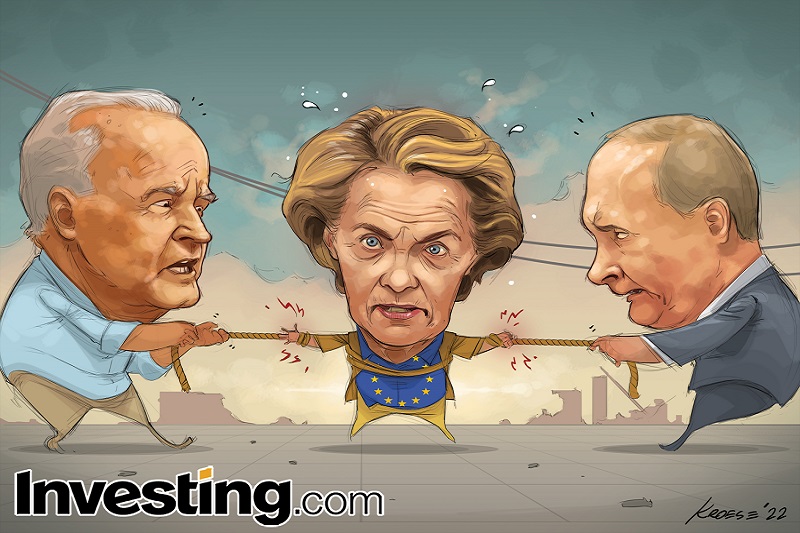By Geoffrey Smith
Investing.com -- Progress toward a peace deal between Russia and Ukraine may be accelerating, but for world energy markets, just as for the devastated cities of Kharkiv and Mariupol, the point of no return has been emphatically passed.
The European Union last week finally bowed to years of various forms of U.S. pressure, saying it will replace at least a part of its natural gas imports from Russia, which arrive largely through pipelines with liquefied natural gas
It has taken a naked war of aggression – the biggest on the continent since 1939 – to make Europe realize that its dependency on Russian energy had left it, effectively, at the mercy of a neighbor that still cannot kick a centuries-old habit of imperialism, under the rule of a man who has never renounced either the methods or aims of the Soviet Union’s KGB. Finally, the penny appears to have dropped.
Under the terms of a deal outlined by the EU and U.S. last week, the U.S. will help source an extra 15 billion cubic meters of gas for European markets this year, rising to 50 bcm a year by the end of the decade. In the short run, Europe will have to scrap for whatever is available on the open market, but in the long run, it seems that the U.S. or U.S. companies’ operations around the world, will ultimately provide much of that gas. Even if that happens as planned, Russia will still be by far the region's biggest energy supplier (it supplied 24% of all gross available energy in the EU in 2020, according to Eurostat), but it will at least have partially redressed a glaringly imbalanced relationship.
As such, the Ukraine war marks a watershed moment in world energy markets: the moment when one of the biggest energy consuming blocs in the world consciously chose to pay up for the peace of mind that comes with security of supply.
The words “Russia is not a reliable energy provider” may not seem as dramatic on the page or to the ear as Joe Biden’s description of Vladimir Putin as a “war criminal” and a “murderer”, but they go straight to the heart of Russia's economic self-image and, as German Vice-Chancellor Robert Habeck spoke them on Monday, they overturned 40 years of (German-led) European economic doctrine that sought to bury past enmities and secure long-term peace with Russia by building economic ties.
“Even during the culminating period of the Cold War, the Soviets never used the oil (sic) as a weapon against us,” Wolfgang Ischinger, the chairman of the Munich Security Conference, said on Monday. “We thought ‘this is gonna be like this forever’ and that they would never abuse this relationship.”
The continuity of such thinking – on all sides – is striking. In the 1980s, Ronald Reagan desperately tried to persuade then-Chancellor Helmut Kohl not to sign the contracts that would bring the first Russian gas to West Germany. Kohl persisted, driven by the conviction common to his generation that Germany and Russia must never go to war again (he nonetheless made up to for it to Reagan by persuading a skeptical public to accept the stationing of nuclear-armed Pershing missiles).
Reagan meanwhile made exactly the same arguments about the dependency and vulnerability that have been repeated in recent years by the administrations of George W. Bush, Barack Obama, Donald Trump and Joe Biden – administrations that have had little else in common.
Indeed, one measure of Putin’s recklessness and miscalculation is the extent to which he has broken with decades of Russian strategic thinking - including his own.
By extension, it stands to reason that, once the furore over the current war dies down, the same trade-offs will again raise their heads in some recognizable form. The promise of cheaper Russian energy will always be there, nagging at European industry and governments that can scarcely afford to pass on yet more costs to their customers and voters. Piped gas from Russia will continue to be cheaper than the liquefied version from the U.S., Trinidad, or Qatar, even if Germany and Italy can miraculously build expensive new regasification facilities while at the same time trying to move beyond fossil fuels entirely to meet their climate change goals.
At some point, Europe will have to decide whether to take the cheaper and easier route of reviving the gas trade with Russia, or whether to double down and throw yet more money at its Energy Transition to reduce its overall demand for fossil fuels. But the calculation: “how far to trust Russia?” is a constant of European consciousness throughout the ages. The next time the question is raised, the full price of cheap Russian energy will at least be too clear to ignore.
